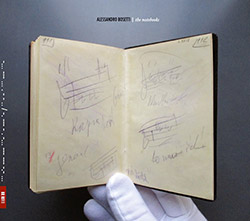
While Bosetti originally made his name as a soprano saxophonist, he's always been interested in the voice, particular in manipulations of the spoken word. This concern has been fore-fronted in his releases from recent years, to better and worse effect in this listener's opinion, but with "The Notebooks" he's truly hit his mark.
His inspiration here is the composer Leoö JanŠček who made a habit of transcribing the sounds of his daily life from the mundane (conversation in a grocery) to the personally meaningful (the final words of his dying daughter, Olga). Two works are presented here, both under the title of 'The Notebooks', the second bearing the added inscription, 'Dante and Beatrice'. Though not provided on the sleeve or insert, the majority of the sounds, apart from the voices, seem to be electric keyboards (particularly an electric piano or something that sounds very much like one) and computer-generated sounds. Immediately, on the first track, we encounter several voices, male and female, speaking in English and another language (Czech?), each heard in unison with musical accompaniment tailored to the tones and rhythms of the speech. Listeners may well recall Scott Johnson's late 80s exploration, 'John Somebody' and there are certain similarities, but Bosetti's music is richer, more open (far less rock-oriented) and, ultimately far deeper. The general tone of the mix between voices and instruments is light and airy, but subtle melodic lines hint at darker themes. Phrases are repeated with variations, vanish for several minutes then reappear in a slightly different guise throughout the piece. New approaches are also consistently introduced as when Bosetti moves from simple statements to playful, quasi-operatic elaborations on same, often tinged with a lovely implied smile. Although a hazy, globular e-piano sound predominates, the sonic texture shifts several times, including a delightful "multitude of bees". The track runs over 35 minutes and there's not a boring moment to be found.
The second track is generally similar with much Italian text befitting its subject and perhaps a bit more regularity in accompanying music, which involves more repeated, almost minimalist patterns. Bosetti's voice is light and benevolent, skating over and through the keyboards (which include allusions to ecumenical music), scattered percussive sounds and other noise. As with the first track, a delight.
The Notebooks provides a wonderful introduction to Bosetti's sound-world and, if you've already heard his work, this is an excellently realized extension.
Comments and Feedback:
|



